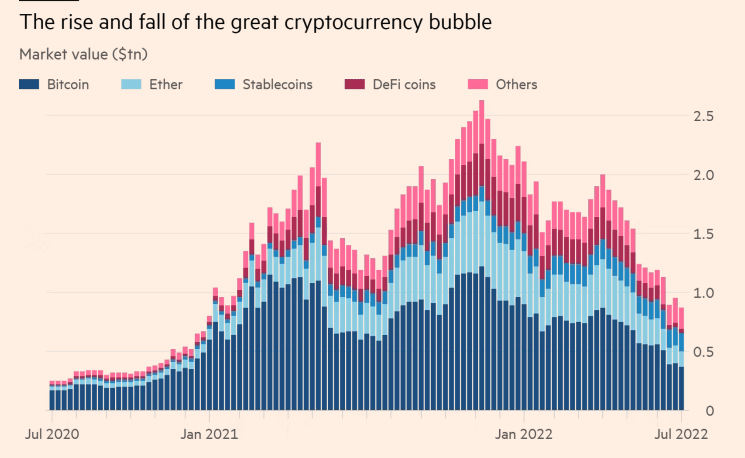A risky game on bitcoin is pushing El Salvador to a devastating catastrophe

No other country is as bullish as El Salvador when it comes to bitcoin. Bitcoin was seen as a tool to transform the country’s economy and bring about a financial revolution that the people of this small and poor Central American country could take advantage of.
In September last year, Nayib Bukele, the country’s president, stunned the financial world by declaring the most popular digital currency a national currency. However, it seems that his gambling is becoming catastrophic for his countrymen. This highlights the link between cryptocurrency’s much hyped insurance and the actual economic reality.
Due to the global downturn in the crypto market, 60% of the value of the bitcoin holdings owned by the authorities has evaporated. After Mr. Bukele failed in his efforts to keep cryptocurrency investors excited and raise new capital, Salvadorans’ use of bitcoin has plummeted and the country is now short of money.
Surprisingly, despite the financial problem, Mr. Bukele’s popularity has not diminished. Surveys show that more than eight out of 10 Salvadorans support the president. This is due to his widespread support for attacks on criminal gangs, and fuel subsidies that have reduced the impact of global inflation.
Critics say Mr Bukele’s failure to achieve the stated goals of bitcoin – to bring investment to the country and provide financial services to the poor – has revealed the weaknesses of his administration. This has raised questions about his economic viability and the visibility of his ambitious plan to modernize El Salvador at the expense of democratic governance.
His government spent 15 percent of its annual investment budget last year to encourage the use of bitcoin in the country’s economy. Each citizen who downloaded a state-sponsored cryptocurrency payment application called “Chivo Wallet” was offered $ 30 dollars. This is almost 1 percent of the average salvadoran’s annual income. Chivo means “cool” locally.
According to Mr. Bukele, his conversation was listened to by nearly 3 million Salvadorans, who are 60 percent of all adults.
Despite this initial uptick, the use of cryptocurrency has declined.
According to a survey by three US-based economists and published by the National Bureau of Economic Research, only 10% of Chivo users continue to use the bitcoin transaction app after spending the $ 30 rewarded by the government. The survey report also highlights that almost no new users have downloaded the app since the beginning of 2022.
Fernando Alvarez, an economist at the University of Chicago and author of the study, said that “the government left no stone unturned to push the introduction of the app, but it still failed.”
In March, the El Salvador Chamber of Commerce conducted a separate survey and found that only 14% of businesses had made bitcoin transactions since September 2021. Only 3 percent of those surveyed visualized business value in it.
Mr. Bukele’s does not face challenges with the use of bitcoin only from the country. The American Salvadorans have also turned a blind eye to Mr. Bukele’s request to use bitcoin while sending money back to his relatives. According to El Salvador’s central bank, digital currency payment apps such as Chivo accounted for less than 2 percent of all transfers during the first five months of this year.
But the introduction of Bitcoin was not the only challenge Mr. Bukele had to deal with.
A global decline in cryptocurrency that has wiped out more than $ 2 trillion, in terms of market value, was another blow to Mr. Bukele’s bitcoin push. The global market value of crypto fell below $ 1 trillion for the first time since 2021. Just to put things in perspective, the market value of cryptocurrencies shot to nearly $ 3 trillion at the end of last year.

People now say that his $ 30 scholarship received from the Chivo app was worth $ 10 after the recent price collapse.
Despite the downturn, entrepreneurs and bitcoin enthusiasts claim that El Salvador has been transformed by bitcoin and that it has opened up new economic opportunities for its citizens that the regular banking system lacks.
But people directly / indirectly involved in El Salvador’s bitcoin ambition have begun to downplay the situation.
“To the extent that we strive for financial freedom, we remain on track for that,” said Eric Gravengaard, CEO of Athena Bitcoin. It is a US-based cryptocurrency company that manages El Salvador’s network of cryptocurrency ATMs, as well as processes bitcoin transactions for some of the country’s largest retail chains.
On the other hand, critics are not convinced by the argument, claiming that bitcoin has failed to create a wave of cryptocurrency entrepreneurs that was expected earlier.
According to El Salvador’s central bank, since the cryptocurrency was declared an official currency in the country, only 48 new bitcoin-focused companies have registered in the country. This is less than 2% of all businesses opened in 2019. According to Leonor Selva, CEO of El Salvador’s National Association for Private Enterprise, almost all of these listed companies are startups, have created insignificant employment and made little investment.
“Today, the impact has been zero,” she said. She also focused on the fact that bitcoin has done damage to existing systems instead of reforming. She argues that bitcoin has intimidated traditional financiers as they are now concerned about the impact of bitcoin on economic stability.
But not everyone is disappointed. Gerson Martinez, a Salvadoran bitcoin founder, is still quite optimistic.
Mr. Bukele has not been discouraged by the price crash, and his enthusiasm for bitcoin has given him admiration from the global cryptocurrency community.
Over the past year, Mr. Bukele has posted a series of tweets saying he has purchased nearly 2,400 bitcoin tokens for $ 100 million since September. He responded to critics who accused him of financial irresponsibility by saying that transactions are made on his mobilewhile you are naked.
He declared Bitcoin as the future of currency, after announcing its latest purchase in the midst of an ongoing sale of cryptocurrency. “Thank you for selling at a low price.”
It is not clear where bitcoin assets are located, their value, payment method or who owns the codes that prove ownership.
According to last week’s estimates from Disruptive magazine, Francisco Gavidia University, San Salvador, Mr. Bukele’s bet on bitcoin has resulted in a loss of $ 63 million, so far. The loss becomes even more worrying after realizing the fact that it was public money that Mr. Bukele has invested in bitcoin. For a small and poor country like El Salvador, the loss is quite significant.
As the government struggles with rising food and fuel costs and a future debt payment, the growing losses are worrying.
Mr Bukele highlighted the funding problems and decided to cut payments to local authorities last year, which led some mayors and councilors to reduce services such as scholarships and water infrastructure.
“The problem with Bitcoin is that no one actually earns anything,” said Carlos Acevedo, a Salvadoran economist and former central bank governor. It is an investment that provides no social benefits.
Already, the collapse in cryptocurrency prices has ruined a key plan for Mr. Bukele’s economic experiment: the issuance of the first bitcoin-backed government bond.
The bond would have enabled Mr Bukele to bypass traditional financial institutions, such as the International Monetary Fund (IMF), which has linked the availability of new funds to the country with financial discipline.
The government has now withdrawn from the $ 1 billion bitcoin-based bond. It has delayed the project indefinitely in March, citing the deteriorating global economic situation due to the ongoing conflict between Ukraine and Russia.
Economists now believe that the bitcoin-occupied country has fewer opportunities to pay $ 800 million in debt due in January and subsequent payments due later this year.
Mr. Bukele is finally on the fence now. Drastically reducing public spending at the risk of irritating voters, or putting the country in default are some of the few options left for him. A default can lead to disruptions in basic imports, slow down growth, or lead to a bank run.
Frank Muci, a policy expert from the London School of Economics who has studied El Salvador’s Bitcoin bond, said that “Bukele showed that he cares less about public image than good financial management. But in the end, the chickens will return to chicken coops at a very high price. for the country. “
As experts believe that this time the crypto winter is expected to be far longer than ever before, the biggest challenge for Mr. Bukele would be to buy time. Although the cryptocurrency is bouncing back to its glory days, which is unlikely to happen in the first place, El Salvador may not reap significant benefits until the cryptocurrency market gains confidence in leading economies such as the United States, China and India.
























